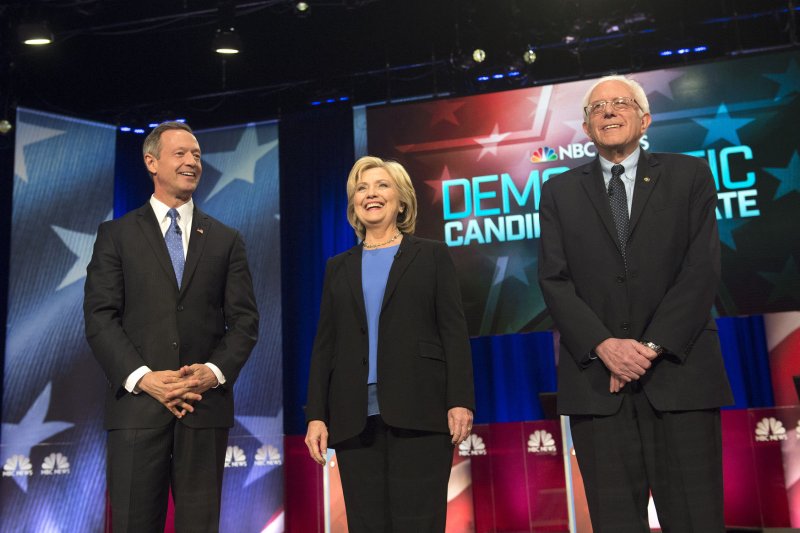Democratic presidential candidates former Secretary of State Hillary Clinton (C), Sen. Bernie Sanders (R) and former Gov. Martin O'Malley (D-MD) arrive on stage during the Democratic presidential primary debate at the Gaillard Center in Charleston, South Carolina on January 17, 2016. Photo by Kevin Dietsch/UPI |
License Photo
WASHINGTON, Jan. 27 (UPI) -- The announcement of a new Democratic presidential debate before the New Hampshire primaries presents a problem for candidates and the Democratic National Committee.
The debate, to be hosted by The New Hampshire Union Leader and MSNBC, was announced Tuesday and scheduled for Feb. 4, five days before the primary. So far only former Maryland Gov. Martin O'Malley has accepted the invitation to attend.
As for the other two Democratic hopefuls -- former Secretary of State Hillary Clinton and Sen. Bernie Sanders, D-Vt. -- their attendance could spell trouble for their campaigns, and for the DNC.
Under DNC rules, candidates may not participate in debates not sanctioned by the party. The Union Leader/MSNBC debate was not sanctioned. If candidates break the party rule and attend anyways, they could be banned from future sanctioned debates.
"Hillary Clinton would be happy to participate in a debate in New Hampshire if the other candidates agree, which would allow the DNC to sanction the debate," Jennifer Palmieri, Clinton's communications director, said in a statement Tuesday.
Shortly after Clinton's campaign put out a statement, DNC chair Rep. Debbie Wasserman Schultz, D-Fla., issued a statement of her own saying the DNC has expressed no interest in sanctioning the Feb. 4 debate.
"We have consistently worked with our campaigns to ensure a schedule that is robust and that allows them to engage with voters in a variety of ways, whether through debates, forums, town halls, but also leaving them the flexibility to attend county fairs and living room conversations in states like Iowa and New Hampshire where direct voter contact matters so much," Wasserman Schultz said. "Our three major candidates are already scheduled to appear on the same stage next week for the New Hampshire Democratic Party dinner on February 5th."
The party dinner is not a debate format. The DNC told The Hill on Tuesday there were no plans to make an exception to the rule.
Sanders' campaign told The New York Times he'd like to work with the party to schedule more debates -- after the New Hampshire primary.
Wasserman Schultz has already come under fire for scheduling fewer debates for Democratic candidates than the Republicans have, and scheduling them mostly on weekend evenings. She defended those decisions in her statement Tuesday night, saying the debates broke viewership records.
This new debate puts her in a unique bind, though. If Sanders or Clinton -- the leading party candidates -- chose to go ahead and participate, she would run the risk of shutting one -- or both -- of them out in a race where she's already been accused of playing favorites. If Sanders were to change his mind and participate, it would lend credence to his accusations the party favors Clinton. If Clinton were to participate, the DNC would effectively put the kibosh on a candidate favored by party standard-bearers. All of this is in the crucial limbo period between the Iowa caucuses and the New Hampshire primaries.















